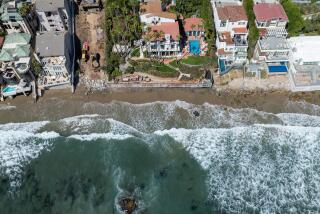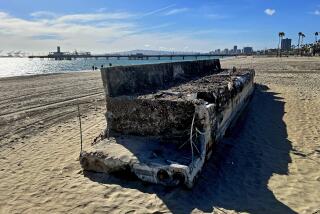SPECIAL REPORT: Oil on the Beach : A Postcard-Perfect Shoreline Is Smudged
- Share via
The oil spilled into the sea and the wind delivered it to our shores in teasing, grimy licks or in steady waves of foaming filth.
It crept in slowly, tauntingly, then retreated with the tide, loitering, as if deciding where it would strike next.
The nearly 400,000 gallons of crude that poured from the wounded hull of the American Trader soiled the sands in Newport Beach, Huntington Beach and, irregularly, to the north.
Hundreds of people, volunteers and those paid to do a job, turned out to mop it up.
Nurse’s aide Michelle Vale of Costa Mesa was barefoot and bent at the waist, her pants rolled to her knees, as she blotted the sand near the Newport Pier with what looked like a thick paper towel. She’d been that way for about three hours; she was cold and wet. Her back ached.
“We moved out here from Arizona because my husband wanted to be by the ocean,” she said. “And here we have a tragedy on our hands. We have to be here. . . . We are already in trouble with the environment. The Valdez was one warning. We chose to ignore it. This has got to stop.”
Vale went on with her task, an unarmed sentry, keeping an eye on the sea gulls nearby.
Orange County’s environmental tragedy was at once communal and personal. People bemoaned it, seethed with the news of it. Shock mushroomed into anger and later, to sadness and frustration.
Not far from where Vale worked, two tall, long-haired men marched with placards, silently defiant, as if they were picketing the sea.
“Idiots Rule,” read one of the signs. “Save our Environment!” said the other.
“When I grow up I want to be a marine biologist and a writer,” said 13-year-old Misty Mallory, picking up bits of petroleum debris on the Newport shore. “I want to write about marine conservation and about how they are messing it up. This really makes me mad!”
Frank Rhodes was standing just outside the entrance to the beachfront house where he has lived for 15 years as he watched the strange parade before him with a Budweiser at hand. He used binoculars to see past all the television trailers and from there, out into the sea.
“I think we have been very lucky,” he said. “We take where we live for granted. The oil companies, I don’t think they really care. All they’re worried about is their big bucks; the rest can go to hell.”
A little farther south, however, the slow, jagged spread of the crude seemed to make this environmental calamity more amorphous. Here, the media did not cluster and the view from the luxury homes was much the same.
Roller skaters still zoomed along the shorefront sidewalk, joggers and bicyclists too. Boys played basketball on the asphalt court off beachfront Newport Elementary School. One fiddled with a sailboard in the sand.
Still, word of the tragedy seemed to be on everyone’s lips.
Justin Torres’ third-grade classroom from Newport Elementary made a field trip to the pier to see if the boys and girls could help with the cleanup.
“The fumes were too strong, so they wouldn’t let us help,” Justin said. “This oil is really bad. It kills animals or it gets them all sick, and then we can’t go into the ocean.”
And Natalie Turpen, talking with a friend at the 15th St. Surf Shop, said she would never forget the bird that she saw the other night.
“He couldn’t even move his wings, they were so soaked with oil,” she said. “I just watched him drown. It makes me feel so bad.”
But it was the sight of contract workers along the beach, looming like some odd sort of extraterrestrials in yellow slickers and pink hard hats, that seemed the surest sign that something wasn’t quite right.
The men moved in small groups, past the signs that read “Danger Beach Closed.” They poked at the sand for hardened globs of crude that they tucked into long plastic bags.
They moved slowly, some hardly at all. This for them was only a job, paid at $7.50 an hour. They were pulling down 12-hour shifts.
“Most of these guys, they’re just here ‘cause they get paid,” said one of the workers. “We’ve got 45 guys right here. If they had been picking up the stuff earlier, we wouldn’t have to look for these chips right now.”
The mood changed, dramatically, at Huntington Beach. It was desperation, underlined with outrage and fear. The delicate ecological sanctuary of the Bolsa Chica wetlands might yet be in the oil’s path.
As it was, a lifeguard-storage garage converted into an avian hospital was overburdened with oil-drenched birds, stunned and lucky to be alive, who were kept quiet and fed. Later they would be washed.
“It upsets me because all of this was caused by man,” said Amy Sano, a senior at the city’s Marina High School who stood watching a bulldozer tear up oil-sprinkled sand near Huntington pier. “And it’s the animals who are paying for this.”
Sano and her classmate, Jenny Satler, stayed out of school for two days so that they could lend a hand. “When I have kids, I don’t want to say, ‘Gee, this is where our beach used to be,’ ” Satler said.
The girls were angered, however, that authorities refused to let them help as much as they would have liked.
“We had to stay 50 feet from the shore,” Satler said. “They wouldn’t even let us go in and get birds that were there! One woman was so upset that she was crying. She threw down her box and left. She had to watch a bird die because they wouldn’t let her get it. They said they were busy with other things.”
Emotions ran high too among those helping to take charge. Huntington Beach lifeguard Rick Reisenhofer said he feared that it could take years to really clean up the mess, much of it invisible to those on land.
“I guess we were just playing the odds,” he said. “You have all this tanker traffic here. . . . That’s 20/20 hindsight, I know. . . . Accidents happen.”
More to Read
Sign up for Essential California
The most important California stories and recommendations in your inbox every morning.
You may occasionally receive promotional content from the Los Angeles Times.













